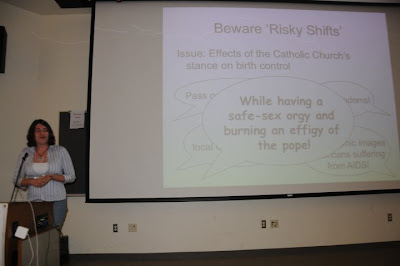Last night I attended a planning meeting for the Secular Student Union at the University of Washington. It’s equivalent to the group I started at Purdue, and also an affiliate of the Secular Student Alliance. What was interesting to me, as a Board member of the SSA, was how little regular members they had attending meetings.
You would think a liberal area like Seattle would produce way more members than an area like West Lafayette, Indiana. And obviously there are many variables that could contribute to this issue – leadership differences, advertising, event planning… But this is a trend I’ve seen talking to lots of student groups across the country. It makes sense when you think about it: When your non-theism is in the majority, or at the very least when no one cares about it, there’s less incentive to have a club.
In Indiana, clubs like the Society of Non-Theists are the one thing people have keeping them sane from the surrounding area. It’s the only place you can be completely open, safe, and accepted. Seattle isn’t a religious area, so there’s no reason to stand on the rooftops shouting about atheism.
Or is there? I personally think so. Yes, community was one of our main goals at SNT, but it wasn’t the only goal. At UW, you may not need a club to find friends, but you can still use it for volunteering, intellectual discussion, and debates about more controversial issues. For example, many people in the area may not be religious, but you can show how important it is to speak up for your secularism. You can have events educating people about the Catholic Church’s stance on condoms, or how some Islamic beliefs interact with free speech.
What do you think? Do secular groups still serve a purpose in less religious areas? Or is our job here already complete?









